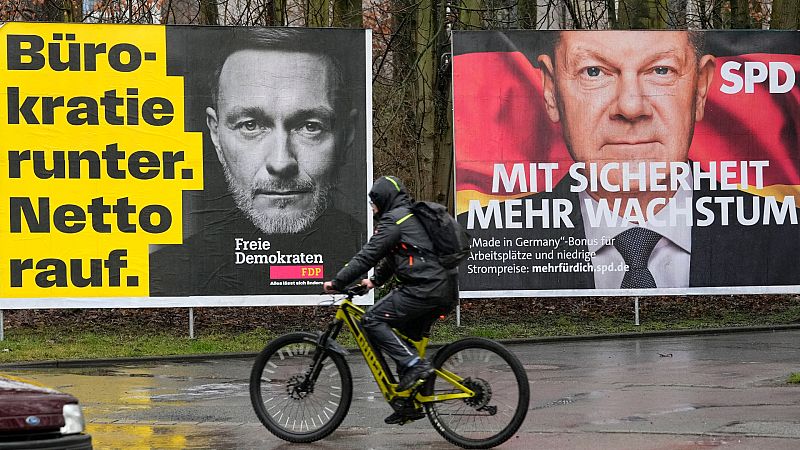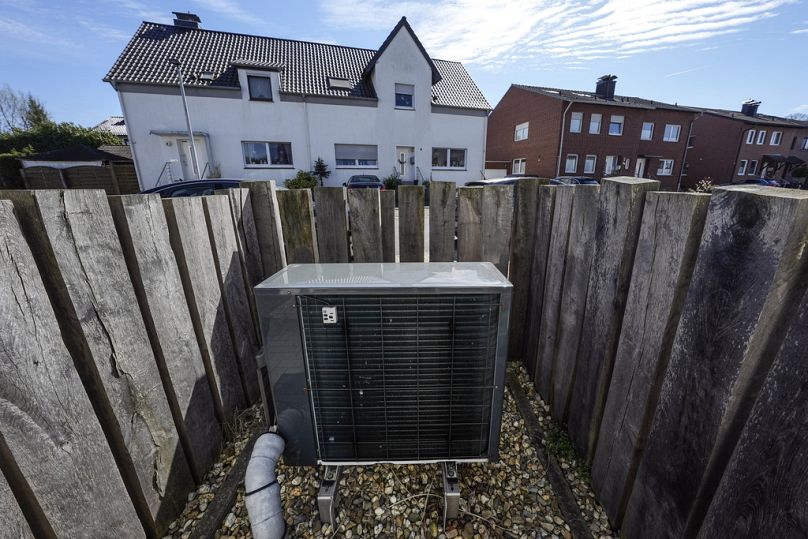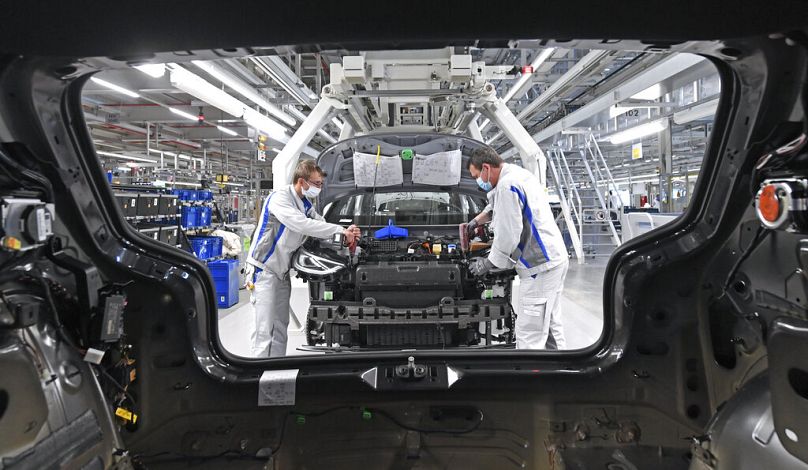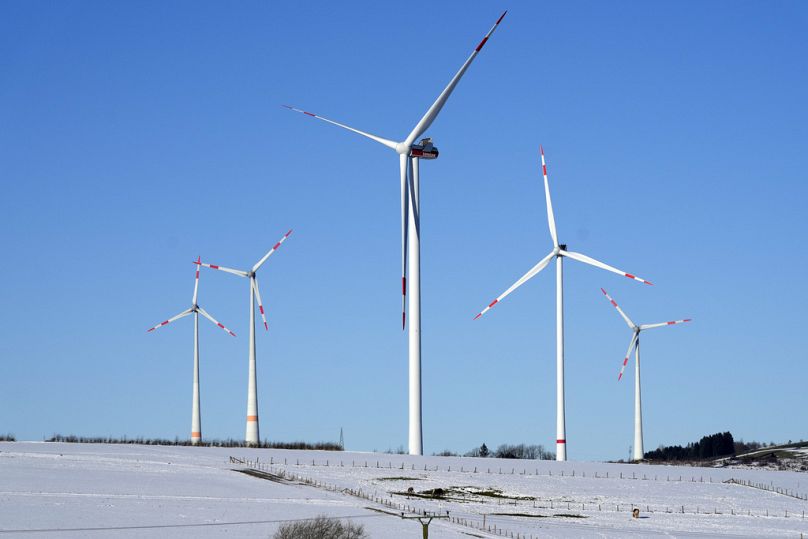German Election 2025: Where do political parties stand on key climate issues?

Millions of Germans will head to the polls on 23 February to vote in a snap election.
Initially scheduled for September, it was triggered after the collapse of the coalition of the Social Democrats (SDP), Free Democratic Party (FDP), and Greens in November last year.
During the last election in 2021, climate change and energy were key issues for German voters. Despite 2024 being the hottest year on record, this time, they have taken a back seat with campaigns, instead prioritising policies on migration and security.
Climate change has dropped down the list of voter priorities, and politicians have steered clear of talking about the issue, believing it won’t win them the election.
Do German voters think climate change is a key election issue?
When voters were polled for the 2021 election, they ranked climate change ahead of immigration and COVID-19 as top election issues. It allowed the Greens to make substantial gains, achieving 14.7 per cent of the vote driven by their support for environmental policies.
But the political climate in Germany has changed dramatically since then, with voters prioritising other current issues over climate change in their election decisions.
Two fatal attacks in the cities of Magdeburg and Aschaffenburg, in which the suspects were from Saudi Arabia and Afghanistan, have fuelled fierce debate about migration and security. Bureaucracy, rising energy costs, and a car industry struggling to keep up with demand for electric vehicles have seen the economy shrink for two years in a row.
The latest polling from election analysts Forschungsgruppe Wahlen saw respondents name peace and security (45 per cent) and the economy (44 per cent) as the most important issues for their own voting decision.
With two possible mentions per respondent, social justice came in third place with 39 per cent, then refugees/asylum issues at 26 per cent.
These key points are followed by pensions/old-age security at 22 per cent and, lastly, climate protection, also at just 22 per cent.
What are the key climate and energy issues influencing the German election?
Though climate and energy have taken a back seat during this election, a few stand-out issues demonstrate the country’s political divide. Climate change, in particular, has become a divisive topic in German politics, which is evident in the major parties’ manifestos.
Home heating laws
In late 2023, the German parliament passed an amendment to the country’s Building Energy Act. This would mean all newly installed heating systems have to be powered by at least 65 per cent renewable energy, sparking a transition to heat pumps, ‘hydrogen ready’ gas boilers, or other low-carbon systems.
This amendment was already a watered-down version of what had initially been proposed and included allowances to ensure the law was phased in gradually. New builds would be first, followed by other types of homes, allowing people to keep gas boilers for longer.
But home heating quickly became a controversial issue in Germany. Opponents said that an amendment to the law would place an excessive burden on consumers. It became a rallying point for the Alternative for Germany party (AfD), who began relentlessly campaigning against it.
In their election manifestos, the Christian Democratic Union (CDU)/Christian Social Union (CSU), Free Democratic Party (FDP) and AfD all say they plan to abolish the law, as does Sahra Wagenknecht Alliance (BSW).
The Green Party has promised more financial support for installing new heating systems – up to 70 per cent of the cost – and the Left Party says it will cover 100 per cent for low-income households.
Some German politicians are pushing back on an EU-wide ban on new petrol and diesel cars
An EU-wide ban on the sale of new petrol and diesel cars is due to come into effect in 2035. A transition to EVs is “likely crucial” for cutting emissions from transport, according to the Intergovernmental Panel on Climate Change (IPCC).
But several political parties have pushed back against the ban. CDU says it must be reversed, while FDP and BSW argue that the 2035 date needs to be dropped. These two parties say there needs to be less of a focus on the transition to electric vehicles. AfD believes the “one-sided” preference for electromobility needs to stop “immediately”.
On the other side, centre-left parties like the SDP and the Greens are standing by the ban.
Germany is the world’s second-biggest producer of EVs and a lack of clarity on the future of petrol and diesel vehicles has seen industry leaders call for consistent policies from the government.
Germany’s net-zero emissions by 2045 target
Most German parties still back the need for the 2045 net-zero emissions target, but how they plan to get there varies massively.
Like many voters, Germany’s two big, centrist parties have their sights set on the financial implications of this transition.
SPD says climate protection is an urgent task, but it wants to “make things more pragmatic”. Part of that focus is ensuring that climate-friendly alternatives are better, more convenient, and cheaper. The party is backing solutions like a speed limit of 130 km/h on motorways and climate-neutral heating networks across entire cities rather than individual heat pumps in homes.
The CDU/CSU union is “firmly set” on the existing target but is also looking at the financial implications of climate policy. It says climate protection and reaching the 2045 net-zero goal must not affect the economy. Where tougher policies to decarbonise heating and transport are favoured by the SDP, it instead prioritises carbon pricing.
The centre-left environmentalist Green Party opposes a weakening of climate policies, emphasising that Germany is the EU member state with the highest emissions. But it also says this will only be acceptable if emissions cuts are easier and more affordable. Rather than rolling back climate protection, the Greens believe this can be done through a “mix of instruments” like subsidy programmes or emissions trading.
The Left goes even further by pushing for Germany to reach its net-zero target by 2040. It wants to do this through a mix of measures like taxes on the super-rich. This includes a frequent flyer tax, bans on super yachts and private jets, and higher taxes on large, heavy cars.
Centre-right FDP believes that market mechanisms are the fastest way to advance climate protection. It says the state shouldn’t intervene everywhere and rejects policies like speed limits and motorways. The FDP wants to push back the net-zero target to 2050. Its focus on market mechanisms means that emissions trading and CO2 pricing are important policy points.
Left-wing BSW doesn’t think climate neutrality is possible in the foreseeable future, saying policies to get there are “extremely expensive and often unrealistic”. It wants to abolish CO2 pricing and warns that cheap energy isn’t achievable with wind and solar alone.
BSW doesn’t reject climate policies outright, believing the issue needs to be “taken seriously,” but it also doesn’t provide a specific target for the net-zero goal.
The far-right AfD doesn’t believe that global warming is human-caused, with its manifesto questioning the “supposed scientific consensus” on climate change.
The party has said it wants to withdraw from the Paris Agreement and ”rejects every policy and every tax that is related to alleged climate protection”. That includes any expansion of wind energy or solar farms, and any state funding for EV charging.
Today




